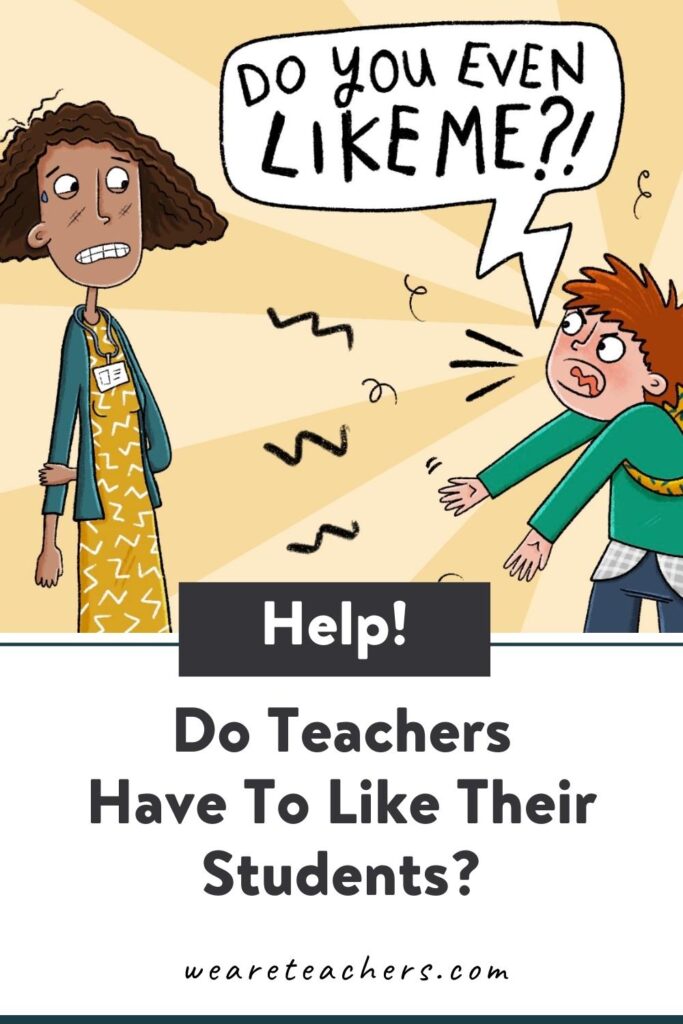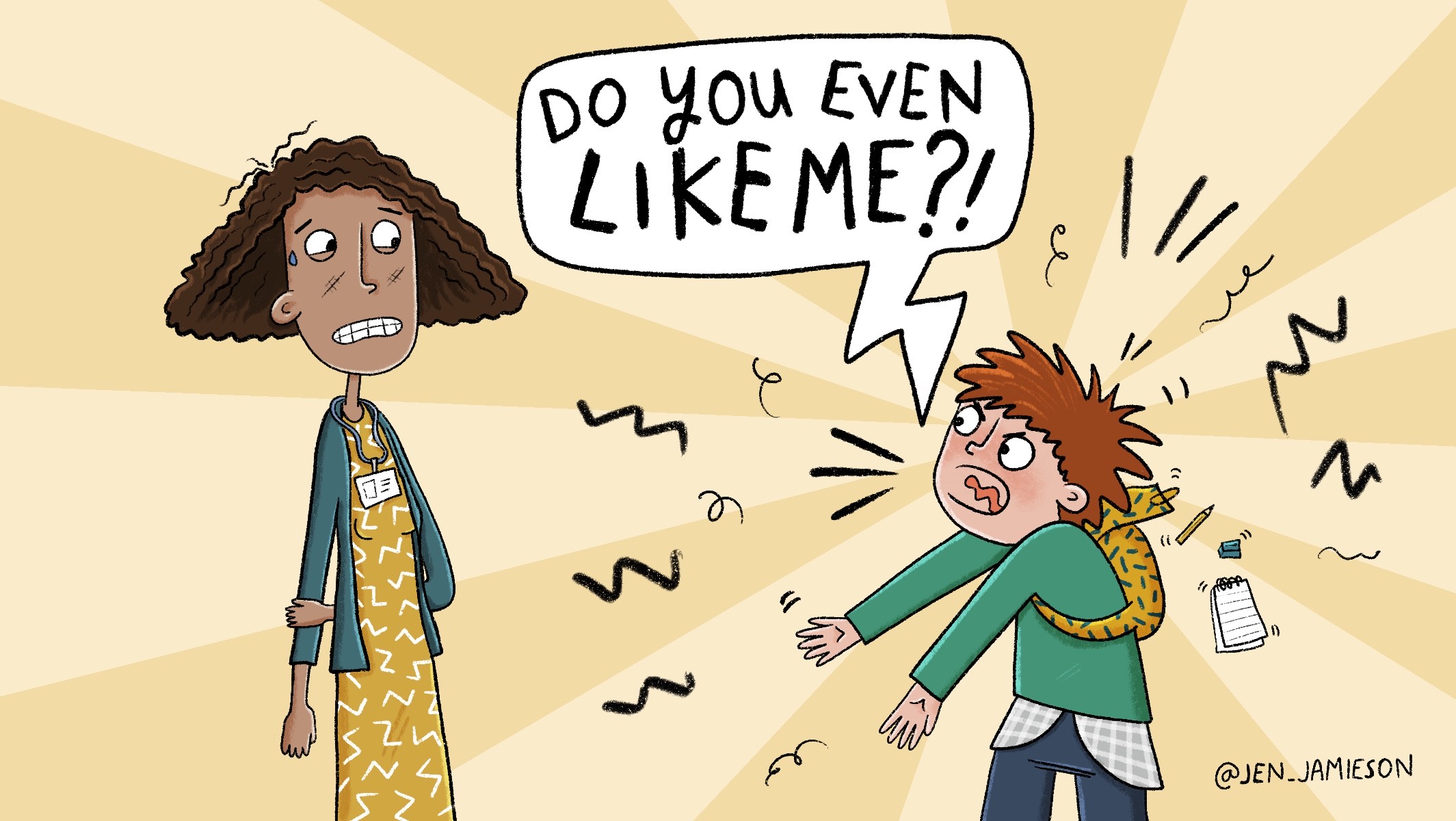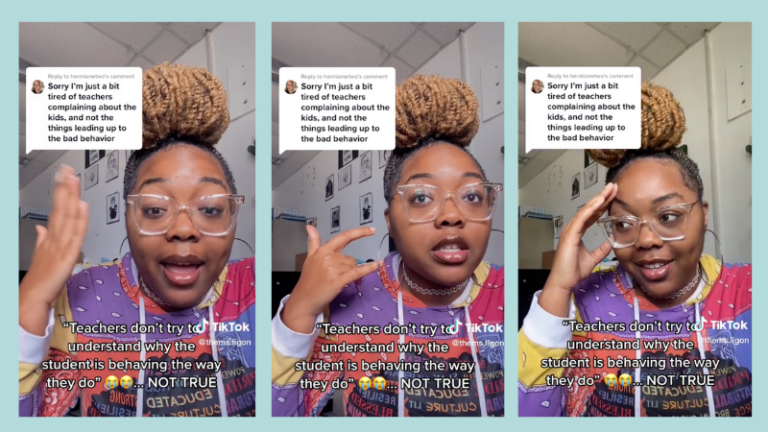Dear We Are Teachers,
I have perhaps the most irritating student I’ve had in my 10-year career. When I emailed his parents that he was being disrespectful and disruptive in class, the father emailed back asking what exactly he said and how exactly he was being disruptive. Eventually this escalated to a heated parent conference that my principal sat in on. Halfway through, the student’s mom said, “Do you even like [student]?” I was so caught off-guard, I didn’t know what to say. Later, my principal said I should have said yes—that I’m supposed to like all my students. I enjoy almost all of my students, but I think this expectation is absurd. Who’s right?
—YOU CAN’T MAKE ME
Dear Y.C.M.M.,
Oof. I have been the teacher flabbergasted and hurt that a parent would accuse me of exclusively picking on their child. I have also been very, very close to uttering in our first-ever parent meeting as a parent a few weeks ago, “Do you even like my kid?!” From both sides of the parent conference table, this situation is a bummer.
Here’s my take: I don’t think this conversation is actually about our feelings about our students. Students aren’t “likeable” or “unlikeable.” We all—adults included—have things about us that are wonderful as well as areas we could work on.
That said, I do think your students have to believe that you like them. By that I mean your actions, behavior, and words should show that you respect them as a learner and as a person.
It’s easy to say, “But I do respect all my students and treat them fairly!” Interrogate that. Compare how you interact with and respond to this student versus how you treat the students you enjoy. Do you greet them with the same friendliness and enthusiasm? Seek out their feedback and opinions? Ask them about themselves in a kind and curious way? Sometimes we can get so bogged down with a tough student that we don’t realize we’ve been fanning the flames of discontent.
Some additional things to consider:
- Scrutinize the behaviors in this student (or students) that you have a tough time with. I will never forget the day one of my coworkers innocently asked in a gap in conversation at our faculty lunch, “Do you ever wonder if the kids who irritate you the most do so because they have the traits you most despise in yourself?” This coworker ignited pure chaos. We gasped. We pretended to yell at him (good-naturedly). He was right. We hated it. But you know what? It made it a lot easier to be empathetic and seek out connection with our challenging students in the future.
- Fake it ‘til you make it has some truth to it! If it seems hopeless that you and a challenging student will ever get along, try pretending that they delight you. I’m serious! It’s science. You might convince your student as well as yourself.
- “Liking” a student doesn’t mean “never expressing displeasure.” You can like and even love a student and still redirect them. Arguably, that’s something you have to do for people you respect.
If you can’t find anything likeable about one of your students or can’t bring yourself to pretend to like one of your students, it might be time for a break. Or at least time to unpack these feelings and/or stress with a mental health professional.
Dear We Are Teachers,
Earlier this week, one of my high school students arrived to my last period class late and smelling strongly like weed. I emailed the front office immediately and cc’ed our principal (I didn’t want to call on the classroom phone and air his business). Evidently, the parents were very angry when this kid arrived home smelling like weed. After an investigation, I got written up for emailing instead of calling the front office! All our handbook says is, “If you suspect any form of substance abuse, immediately notify your administrator,” which I did. Should I fight this?
—PUNISHED FOR COMPLIANCE
Dear P.F.C.,
Since a write-up goes on your record, yes, I would ask to meet about it. But before you do, meet with your union rep (or have a chat with whoever’s in a union at your school). They might have some additional pointers for you.
Your principal might not realize it, but they are totally blame-shifting here. They dropped the ball on checking communications, and they didn’t make their expectations for reporting clear enough. As a leader, they ought to know that’s on them.
Knowing your principal’s, um, sensitivity, approach the meeting with a focus on your actions and intentions, not where your boss dropped the ball.
“I wanted to clear up my intentions in reporting the student the other day. As soon as I smelled marijuana, I recalled my training and did what was outlined in the handbook. I chose to email in order to respect my student’s privacy. Since I was following protocol, I was wondering if we could talk about taking this write-up off my record.”
While you’re there, it would also be worth asking what the expectations are for reporting suspected substance abuse while you have a class full of kids. Does the principal really want you airing that kind of unsubstantiated dirty laundry for 30 other ears to hear? That also seems like a pretty big liability.
Dear We Are Teachers,
I adore my coworker of five years. She’s a great friend. She’s an amazing teacher. But she interrupts me ALL. OF. THE. TIME. In conversation. In our PLC. In my classroom. At happy hour. Sometimes she just does this from excitement. Other times she finishes my sentences or tries to interpret or paraphrase what I’m saying—and sometimes she’s not even correct! I’m scared to correct her because she’s also very sensitive. What do I do?
—Girl, Interrupted
Dear G.I.,
You’ve made it five years without telling her? Are you a 9?
My first thought: There is no way—especially as a teacher—that she hasn’t heard this feedback before. Whether her appraiser or principal has told her or not, I’m sure her students have. Kids of all ages are barbarically direct and have no problem identifying our personality flaws with cutting precision. So don’t add any unnecessary anxiety to this conversation by thinking you might be the first to tell her this.
My second thought: Consider that interrupting isn’t always categorically bad. Sometimes it’s a family or cultural norm. To many people, interrupting is a way of connection. Interrupters may feel they’re helping to clarify or elucidate the speaker’s feelings, or they might see interrupting as validating the speaker. A sort of “I hear you—is this what you mean?”
Other times, interrupting is necessary! We all know what it’s like when a dominant, talkative personality has the floor. For students and adults, sometimes a quick, “Hey, I’m going to cut you off there, but let’s table that point for later!” is required to get things done.
First, pinpoint why her interrupting bothers you. Does it make you feel like your thoughts don’t matter? Do you feel rushed? Really get the right words for how it makes you feel.
Then say, “Hey, I was hoping to talk to you about something. You know I adore you and couldn’t choose a better teaching bestie. I wanted to be honest about something. Sometimes I don’t get an opportunity to finish my thoughts when we’re talking. It makes me feel like what I have to say isn’t important. I know without a doubt that you aren’t doing this maliciously. I just needed to be honest about how it feels since I value you and our relationship so much.”
That way, you’re not framing it as “You have a bad habit that you need to quit.” You’re opening up a conversation for her to explain her intentions and perspective. And who knows? Maybe that includes some things you can work on, too.
Do you have a burning question? Email us at askweareteachers@weareteachers.com.
Dear We Are Teachers,
I loved my first three years of teaching (2016-2019). It was hard being new, but I felt like I was doing a good job, that I had parents’ trust, and that I had good relationships with my students. Since the pandemic, I’ve felt ineffective, like I’m “the enemy,” and that my students are totally checked out. When I think about throwing in the towel, though, I think back to how much I loved those first three years. Is there any way to rekindle the love I had for this job?
—All Out of love


